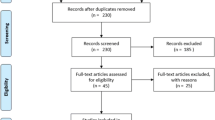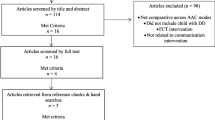Abstract
Objective
This paper explores the potential of advanced language models (ALMs) in enhancing augmentative and alternative communication (AAC) options for individuals with intellectual and developmental disabilities (IDDs).
Method
Possibilities and limitations of utilizing ALMs, such as ChatGPT, to address the communication challenges faced by individuals with IDDs are considered. Potential strategies for leveraging ALM-based technologies in promoting social communication are discussed while emphasizing the need for careful consideration and research.
Results
The paper presents an overview of the potential capabilities of AAC with integrated ALM for supporting social communication for individuals with IDDs. Directions for future research are identified, including evaluating message authenticity, enhancing customization options, addressing ethical considerations, exploring long-term adaptation and learning, and conducting user-centered design studies.
Conclusion
The integration of ALMs into AAC holds promise for promoting social communication and empowering individuals with IDDs, but careful consideration and research are necessary to ensure their effectiveness, ethical use, and user satisfaction.
Similar content being viewed by others
References
Cañete, R., & Peralta, E. (2022). Assistive technology to improve collaboration in children with ASD: State-of-the-art and future challenges in the smart products sector. Sensors, 22(21), 1–31. https://doi.org/10.3390/s22218321
Ganz, J. B., Pustejovsky, J. E., Reichle, J., Vannest, K. J., Foster, M., Pierson, L. M., Wattanawongwan, S., Bernal, A. J., Chen, M., Haas, A. N., Liao, C.-Y., Sallese, M. R., Skov, R., & Smith, S. D. (2022). Participant characteristics predicting communication outcomes in AAC implementation for individuals with ASD and IDD: A systematic review and meta-analysis. Augmentative and Alternative Communication, 39(1), 6–21. https://doi.org/10.1080/07434618.2022.2116355
Gevarter, C., & Zamora, C. (2018). Naturalistic speech-generating device interventions for children with complex communication needs: A systematic review of single-subject studies. American Journal of Speech Language Pathology, 27, 1073–1090. https://doi.org/10.1044/2018_AJSLP-17-0128
Hemsley, B., Bryant, L., Schlosser, R. W., Shane, H. C., Lang, R., Paul, D., Banajee, M., & Ireland, M. (2018). Systematic review of facilitated communication 2014–2018 finds no new evidence that messages delivered using facilitated communication are authored by the person with disability. Autism and Developmental Language Impairments, 3, 1–8. https://doi.org/10.1177/2396941518821570
Hu, K. (2023). ChatGPT sets record for fastest growing user base. Reuters. Retrieved from. https://www.reuters.com/technology/chatgpt-sets-record-fastest-growing-user-base-analyst-note-2023-02-01/
Kagohara, D. M., van der Meer, L., Ramdoss, S., O’Reilly, M. F., Lancioni, G. E., Davis, T. N., Rispoli, M., Lang, R., Marschik, P. B., Sutherland, D., Green, V. A., & Sigafoos, J. (2013). Using iPods and iPads in teaching programs for individuals with developmental disabilities: A systematic review. Research in Developmental Disabilities, 34(1), 147–56. https://doi.org/10.1016/j.ridd.2012.07.027
Schlosser, R., & Koul, K. (2023). Advances in augmentative and alternative communication research for individuals with autism spectrum disorder: Moving research and practice forward. Augmentative and Alternative Communication, 39(1), 2–6. https://doi.org/10.1080/07434618.2023.2181214
Shane, H. C., & Kearns, K. (1994). An examination of the role of the facilitator in “Facilitated Communication.” American Journal of Speech-Language Pathology, 3, 48–54. https://doi.org/10.1044/1058-0360.0303.48
Author information
Authors and Affiliations
Contributions
All three authors conceptualized, edited, and approved the final manuscript. The first author wrote the first draft.
Corresponding author
Ethics declarations
Conflict of Interest
The authors declare no competing interests.
Use of AI Writing Tool
We used ChatGPT during the writing process for this manuscript in the following ways. During the initial planning and outlining of the manuscript, we prompted ChatGPT to “provide suggestions for how ALMs could be used to support people with IDD.” ChatGPT’s response included suggestions related to supporting daily living skills, vocational training, and spoken and written communication. We used the response to narrow down the focus of the article to communication. ChatGPT was also used to write the description of SGD operation with the prompt, “Describe how a speech generating device is used by people with IDD and communication impairment.” The resulting description of SGD operation required only minor edits. Throughout the writing process, awkward sentences that needed to be rephrased to improve clarity were entered with the prompt, “rephrase the sentence to improve clarity”. Finally, after completing the main body of the manuscript, we uploaded the text into ChatGPT with the prompt “write an abstract for this article.” The resulting abstract required minor editing. Before submission, we used plagiarism detection software (Turnitin) to determine if any of the content produced by ChatGPT was plagiarized. One sentence included eight consecutive words verbatim from a previously published article. We rephrased that sentence and the proper citation was confirmed and added.
Additional information
Publisher's Note
Springer Nature remains neutral with regard to jurisdictional claims in published maps and institutional affiliations.
Rights and permissions
Springer Nature or its licensor (e.g. a society or other partner) holds exclusive rights to this article under a publishing agreement with the author(s) or other rightsholder(s); author self-archiving of the accepted manuscript version of this article is solely governed by the terms of such publishing agreement and applicable law.
About this article
Cite this article
Lang, R., McLay, L. & Rispoli, M. Advanced Language Models: Potential to Improve Augmentative and Alternative Communication for Individuals with Intellectual and Developmental Disabilities. Adv Neurodev Disord 7, 481–484 (2023). https://doi.org/10.1007/s41252-023-00350-5
Accepted:
Published:
Issue Date:
DOI: https://doi.org/10.1007/s41252-023-00350-5




